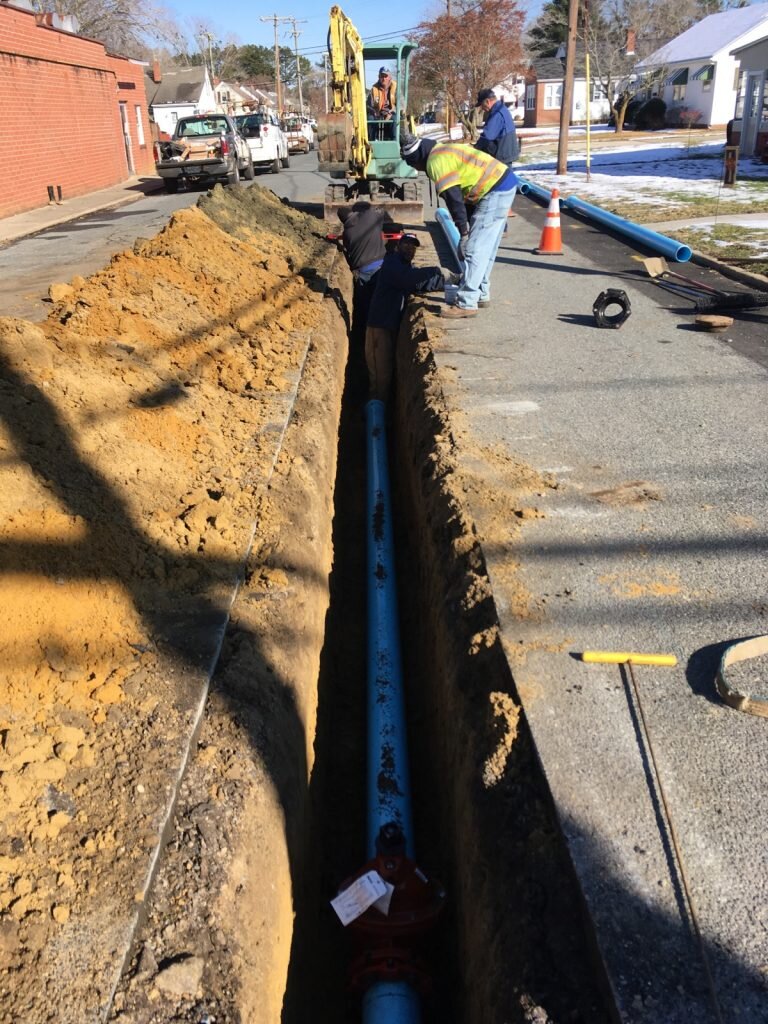(Dec. 28, 2017) As Pocomoke officials pushed toward two solutions to address decades-old water quality issues in 2017, residents are holding out hope red-tinged flow from their faucets will soon become a distant memory.
In early December, City Manager Bobby Cowger said public work crews would be removing underground water pipe in the Pocomoke Heights area on 14th Street. This action came about after unexpected insights were gained following a water leak the previous month in front of the Pocomoke City Volunteer Fire Company.
“We had cut out a piece of the existing water pipe that was there,” he said. “This is on Market Street, and it’s leaving and going down into the Heights.”
After installing a foot of plastic piping to replace the removed section, Cowger said crews opened a nearby fire hydrant and let it run for 20 minutes, before sampling water quality.
Mayor Bruce Morrison related his experience during the November water testing.
“I was totally shocked when I put my hand inside a pipe and it came out black,” he said. “It was greasy. The hydrant ran for 35-40 minutes and it never cleared up.”
Cowger said the initial section on 14th Street would be done in-house for about $25,000 in materials and $15,000 in labor, while estimating a contractor would charge closer to $100,000 for the equivalent work.
“Every pipe we do, there should be a little bit of an improvement, especially where our water treatment plant is being rehabbed,” he said. “That’ll be done by the end of December or middle of January at the latest.”
Cowger said the town also would investigate obtaining a grant, for at least $1 million, through the Maryland Department of the Environment.
“We’re going to take a full look at the entire pipes, some of Market Street and any other bad areas that we’ve having, and we’re going to put a grant application in to see how much money we can get,” he said. “We do feel that we have an upper hand on getting a grant because of the [poor] quality of our infrastructure and he quality of water that’s coming out of it.”
In May, the City Council approved a $100,00 emergency expenditure for repairs at the water treatment plant based on a suggestion from former City manager Ernie Crofoot.
Crofoot had presented the council a report by Hungerford & Terry, a water treatment contractor, which identified problems with the filtering media and water flow control valves at the treatment plant.
“Over the years, the backwashing apparently has been at an inappropriate pressure, which has caused a significant amount of the filtering material to go down the drain,” he said. “There were also valves … not opening and closing at the right time.”
In addition to replacing six water valves, Crofoot said the report also recommended changing the filter media in four water filters.
“They say we should consider this as an emergency situation to repair and, quite frankly, I understand why,” he said. “The filtering mechanism we need in our water filters isn’t there.”
When backwash pressure levels are set appropriately, Crofoot said, impurities are removed while the media is flushed and water is filtered.
“If the pressure’s too high, that media goes out with the stuff that’s washed out of the filters,” he said.
In July, the council approved borrowing an additional $259,000 to complete the repairs at the water treatment plant.
City Clerk Carol Sullivan said the city received bids from two local contractors to replace filtering media, butterfly valves and water meters, with Somerset Well Drilling, in Westover, selected for the project.
Included in the scope of the project, Somerset Drilling will remove and replace filtering media in all four tanks at the water treatment plant. New support beds of gravel, greensand and anthracite will be installed. Also, 17 butterfly valves will be replaced.
Another approach came to light during a council meeting in early November when Cowger presented a section of heavily corroded underground water pipe discovered after an unanticipated water leak on Market Street.
Councilmember George Tasker said the section of pipe had an unpleasing and all-too-familiar aroma.
“You can take that pipe and scratch and sniff it, and it smells just like what comes out of my spigot,” he said. “How are you going to get rid of that smell unless you change the pipes?”
With underground metal piping that dates back roughly six decades in some cases, Cowger said the solution is self-evident.
“That piping needs to be replaced,” he said. “It’s time that we need to address it, whatever we’ve got to do.”
Engineers contacted by the city had suggested deficiencies at the water plant caused the brownish water residents, particularly in the Heights neighborhood, have complained about for years. However, Cowger said although the 20-year old facility needs repairs, the problem lies elsewhere.
“We’ve spent a lot of money with these engineers, you’re taking half a million to a million dollars, and the water is as bad or worse than it was 20 years ago,” he said. “The water was just like that in 1997 when the plant was brand new.”
Cowger, who came of age in the Heights, said solving the water quality problems is a top priority.
“The town has been waiting for 30 years. They’ve been misled for a long time by the past administration,” he said. “That was my number-one commitment when I came here, that I was going to do something. I’ve been here four months and now it’s coming to fruition.”

